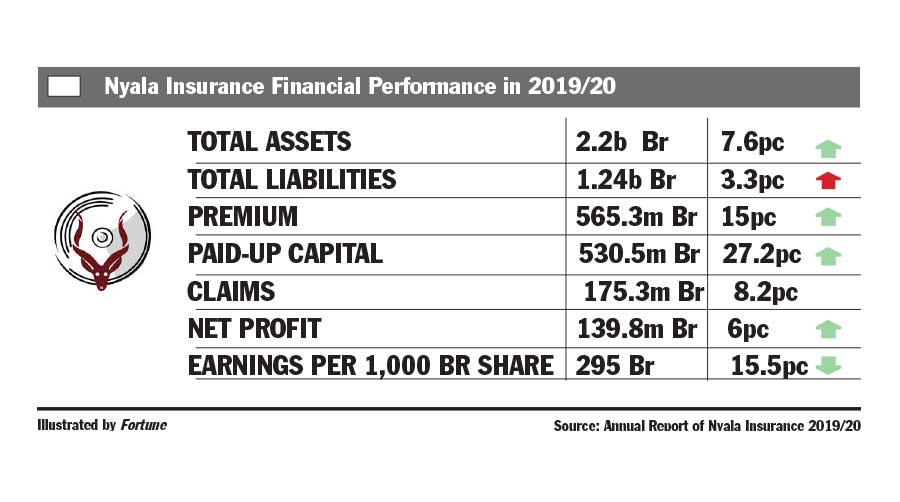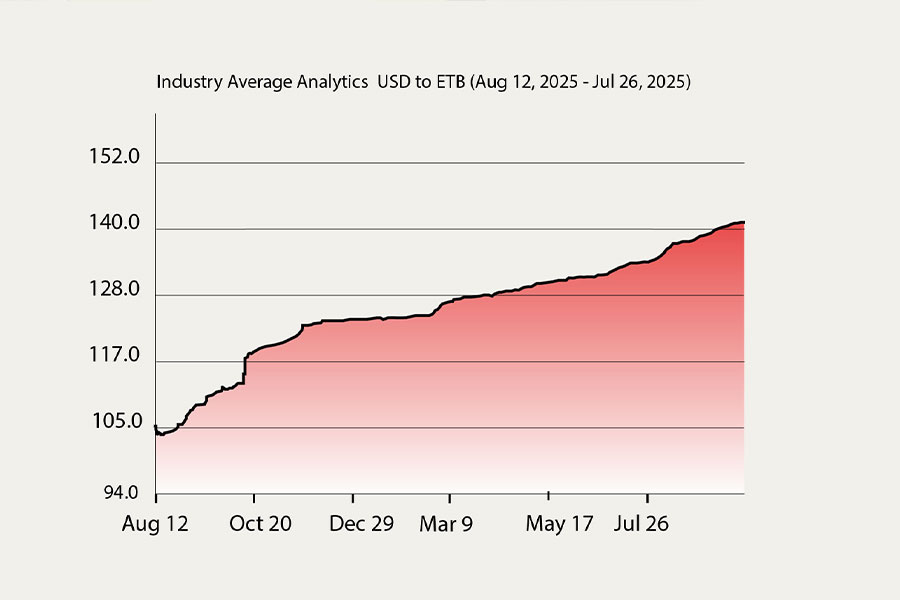
Commentaries | Mar 26,2022
May 21 , 2022.
There was a great deal of handshaking and patting each other on the back at the Hyatt Regency, near Mesqel Square, where the bigwigs of the new economic policymaking team gathered. Ahmed Shidie, Finance minister, and Yinager Dessie (PhD), central bank governor, were joined by not-for-profit advocacy for financialisation, FSD Ethiopia. The main topic was capital markets, a subject that has remained elusive for its aspirants since the mid-2000s.
Some sort of money market is not new for Ethiopia. In the decade beginning 1964, the central bank ran what was the Addis Abeba Share Dealing Group. Addis Abeba Abattoirs and Tendaho Plantation were a few of the 11 companies listed with the Group that ceased to exist in 1974 when the revolution brought private ownership of capital to an end. The ambition to restart a capital market was reborn in the 2000s, spearheaded by the Addis Abeba Chamber of Commerce. It was an ill-fated initiative.
Likened by the EPRDFites to a casino, a daring move to resurrect a share-dealing group was quelled with a stroke of a pen. Sufian Ahmed, then minister of Finance, wrote the chamber leaders a reprimand letter. It was in response to an official invitation for him to launch the share-dealing group. The private sector went hushed, recognising the limits to its ambition. Last week's event at the Hyatt Regency could be seen as the start of healing from this trauma.
A partnership was also signed with FSD Ethiopia to support the long overdue Exchange and strengthen the financial sector. FSD-Ethiopia is an outfit the British government finances and run by Ermias Eshetu, once the CEO of the Ethiopian Commodities Exchange (ECX).
One of the most exciting projects of the Prosperitians is setting up a capital market, which could add dynamism to the economy, offer alternative options for investors and expand the source of funding for businesses. Unfortunately, all the talk of bringing the private sector to the forefront has been moving at a snail’s pace. The Prosperitians appear to be determined to see the exchange market, the Ethiopian Securities Exchange (ESX), fall under the Ethiopian Investment Holdings, the recently formed sovereign wealth fund. Mamo Miheretu, one of the technocrats Prime Minister Abiy Ahmed (PhD) has onboarded, heads this outfit whose take is to mobilise capital from domestic and international markets for investment.
Mamo and his league may argue that a great deal of work has already been done. They may point to liberalisation efforts in the telecom sector, which saw the entry of a new operator that has yet to begin commercial services and development in the financial sector. The latter is worthy of measured optimism. Private banks have expanded in assets, capital, revenues, and market share. The past three years have seen a burst of new products and players, reaching nearly two dozen and perhaps, even more had it not been for the central bank's decision to raise paid-up capital 10-fold.
The leverage the private sector commands is more considerable by the year. Almost the entirety of their loan portfolio is to the private sector.
But these are emblematic of the private sector's enthusiasm more than the government's efforts. The chief criteria for measuring how much space the public sector is willing to cede and allow private sector competition is to pay attention to where the money goes. The results are not as promising; the administration is not putting its money where its mouth is, to the economy's detriment.
Admittedly, public enterprises are now getting less credit than the private sector. They are no longer sucking excessive amounts of credit out of the financial system - a problem that has exasperated public debt. Nonetheless, their debt has continued to grow, at 613 billion, just 29 billion Br shy of loans and advances to the private sector in the previous fiscal year.
Such figures hide an uncomfortable truth. It does not show that the nature of loanable funds flowing to the public sector has changed. Public sector borrowing has gone from crowding out by state-owned enterprises (SOEs) to credit being sucked out of the system through government securities.
Over the past few years, the federal government has developed a thirst for deficit financing using treasury bills. It is not an entirely new phenomenon. Previous administrations did not just print money but sold debt as well. The main buyers were non-banking institutions, especially the Public Servants Social Security Agency, which bought at near-zero interest yields for most types of T-bills. Banks' share of this was barely half a percent in 2018/19.
Although social security agencies continue to be milked at negative interest rates, the tables have turned. From 239 billion Br in T-bills sold last year, a little less than half of the outstanding amount was held by banks by the end of the period. Like the administrations before, this is in addition to direct central bank advances.
In a healthier economy with an autonomous central bank concerned about inflation, this problem would self-correct. As public sector-driven demand for debt increases, the amount of loanable funds in the economy is exhausted, and borrowing costs increase, following the classic logic of supply and demand. Unfortunately, the central bank bullies banks into buying government debt and is too willing to maintain a negative interest rate environment that reduces alternatives for investment.
Excessive government borrowing, combined with a central bank that has surrendered its duty, is crowding out the private sector. The T-bill market could have been a force for good, helping the government finance its deficit without necessarily printing with exorbitance. But neither has direct advances ceased, nor is the liberalised securities market responsibly utilised.
It is within the power of policymakers to create a sustainable credit market. It all comes down to reducing deficit spending. The logic behind ensuring that credit flows to the private sector more than the government is that the former use it more efficiently.
In the best of times, borrowing is concentrated with large and wasteful public enterprises that are rarely made accountable. Reports from the Office of the Auditor General are an indictment of how much wealth is wasted through either larceny or inefficiency. In the worst of times, as in the past two years, borrowing has risen because of growing defence spending, an unproductive activity. Such drawbacks to misusing government securities are without factoring in that, in the end, it is debt and has to be paid back through revenues. It cannot be rolled over forever.
The administration started out promising to ease the state’s hold over the economy. All it has done is rearrange the means through which the public sector exerts its influence. When it comes to tangible results, policymakers have yet to prove themselves.
PUBLISHED ON
May 21,2022 [ VOL
23 , NO
1151]

Commentaries | Mar 26,2022

Editorial | Aug 17,2019

Commentaries | Apr 29,2023

Commentaries | Sep 27,2025

Fortune News | Feb 27,2021

Radar | Nov 20,2023

Radar | Dec 19,2021

Agenda | Sep 26,2021

Money Market Watch | Oct 05,2025

Fortune News | Jan 29,2022

Photo Gallery | 180327 Views | May 06,2019

Photo Gallery | 170524 Views | Apr 26,2019

Photo Gallery | 161557 Views | Oct 06,2021

My Opinion | 137274 Views | Aug 14,2021

Dec 22 , 2024 . By TIZITA SHEWAFERAW
Charged with transforming colossal state-owned enterprises into modern and competitiv...

Aug 18 , 2024 . By AKSAH ITALO
Although predictable Yonas Zerihun's job in the ride-hailing service is not immune to...

Jul 28 , 2024 . By TIZITA SHEWAFERAW
Unhabitual, perhaps too many, Samuel Gebreyohannes, 38, used to occasionally enjoy a couple of beers at breakfast. However, he recently swit...

Jul 13 , 2024 . By AKSAH ITALO
Investors who rely on tractors, trucks, and field vehicles for commuting, transporting commodities, and f...

Nov 2 , 2025
The National Bank of Ethiopia (NBE) has scrapped the credit-growth ceiling that had s...

Nov 2 , 2025 . By SURAFEL MULUGETA
The burgeoning data mining industry is struggling with mounting concerns following th...

Nov 2 , 2025 . By YITBAREK GETACHEW
Berhan Bank has chosen a different route in its pursuit of a new headquarters, opting for a transitional building instea...

Nov 2 , 2025 . By BEZAWIT HULUAGER
Nib International Bank S.C. has found itself at the epicentre of a severe governance...